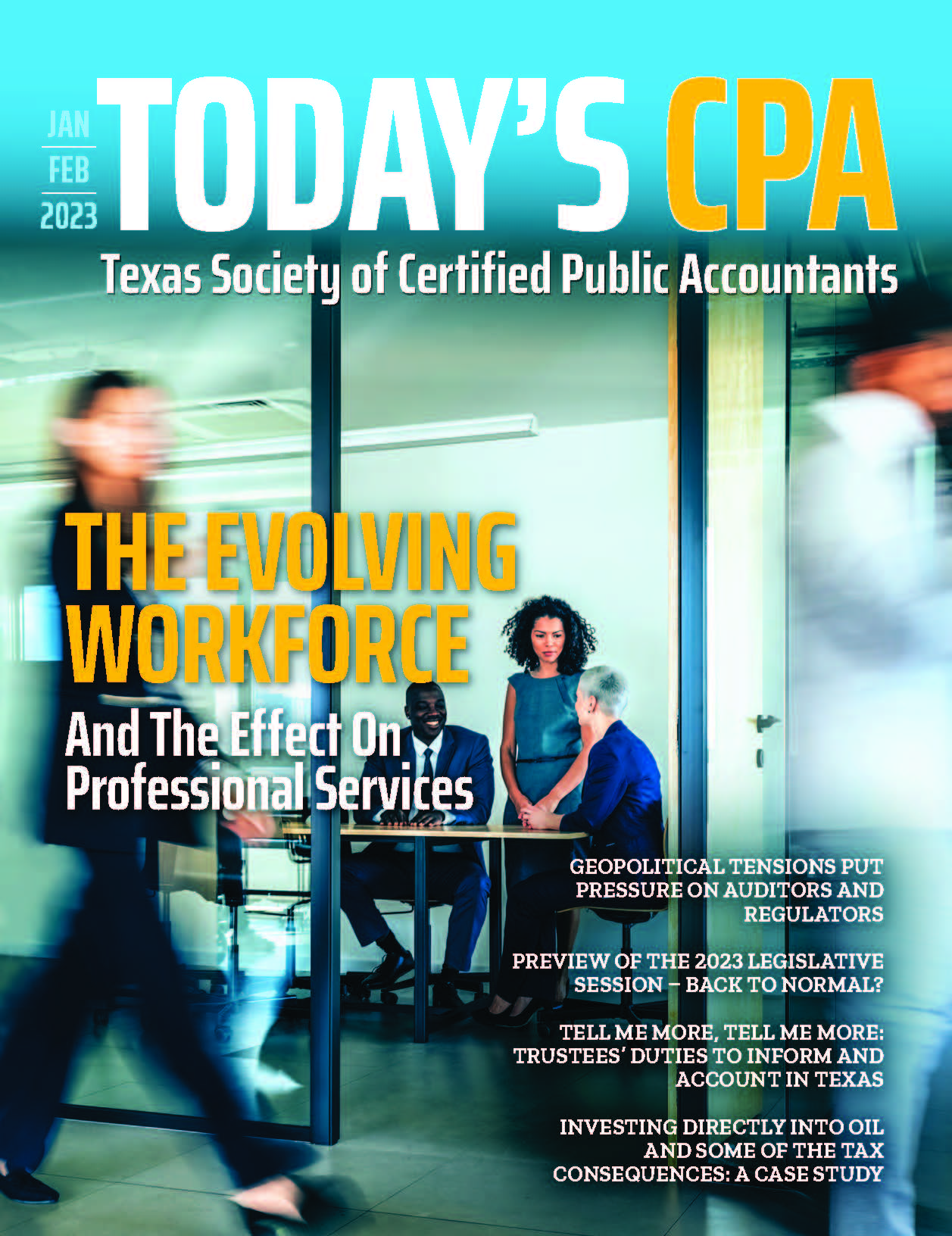Geopolitical Tensions Put Pressure on Auditors and Regulators as Companies Grapple with the Effects of Sanctions and National Sovereignty
ACCOUNTING & AUDITING
By Don Carpenter, MSAcc/CPA
On February 24, 2022, Russian President Vladimir Putin invaded Ukraine in a move that had been anticipated for several weeks. And the ripples of this aggression were quickly felt throughout the world, with energy prices surging and food shortages worsening.
The destruction of the Ukrainian infrastructure has been massive. This force has been met with drastic economic countermeasures against Russia by Western countries on an unprecedented scale. But this is just one of several stress points putting strain on global relationships and highlighting just how interconnected we are.
Also capturing headlines for much of last summer were the simmering tensions between the People’s Republic of China and the U.S. over global expansion, fair trade and human rights. These tensions escalated with Speaker Nancy Pelosi’s visit to Taiwan in August, which caused the Chinese government to cease talks with the U.S. on both economic and military topics. Although these issues seem far away from the world of financial reporting, they present thorny issues for regulators who are responsible for the integrity of the system.
Since the start of the Ukrainian invasion, several hundred international businesses have mothballed their operations in Russia or pulled out completely. This has led to material financial losses that are potentially subject to considerable judgement. It is difficult to assess future cash flows under the circumstances for purposes of impairment testing and going-concern issues. Further, the question of whether non-Russian owners retain legal title to assets after the pullout remain murky at best.
Making matters worse, the pullout was not limited to consumer-facing businesses. Advisory and financial firms with branches in Russia have also come under directives to sever ties in the country. The Big Four and other global firms have cut or are in the process of cutting ties with their Russian affiliates. The major accounting firms are a group of national firms bound by agreements under one common brand.
With the imposition of sanctions, the international network began severing their relationship with their Russian affiliates. This separation introduces inefficiencies and risks with regard to auditing clients’ Russian businesses. If the U.S.-based audit firm relies on the work of the now-independent Russian affiliate, the U.S. auditor must apply higher standards to the work performed in Russia since it will be relying on the work of an independent party.
Sanctions by the U.S. and its allies also require that auditors no longer provide service to businesses or individuals in Russia. To avoid a violation of these sanctions, U.S. audit firms are requesting representations from their clients that they have no significant ties with Russian nationals or companies. In what some are calling “overkill,” these representations may even include a request that the client verify that no Russian national or resident owns 5% or more of the company’s shares.
However, there are limits to the sanctions. Firms are allowed to audit the U.S. subsidiaries of Russian companies or branches of Russian businesses located in the U.S. But given the potential impact on a firm’s reputation, most firms appear to be erring on the side of caution when it comes to continuing any ties to Russian commerce.
The difficulties reach into Ukraine, as well. Since the dissolution of the U.S.S.R. in 1991, trade between the former Soviet republics on the one hand and Western nations on the other has mushroomed. Ukraine has been at the forefront of this, given its location and vast resources. U.S. companies in pharmaceuticals, energy, financial services and chemicals have investments in the country. Other entities may have no direct investment but rely on Ukrainian exports as a critical part of the supply chain. As a result of the war, U.S. audit firms may have difficulty relying on local Ukrainian audit firms or members of their international network to complete even basic attest functions given the destruction of property, records and systems.
Moving further east, the Public Company Accounting Oversight Board (PCAOB), which is responsible for reviewing the quality of audits of public companies, has confronted another set of issues regarding Chinese companies listed on U.S. exchanges. Well over 200 Chinese companies are traded on U.S. markets via the American Depository Receipt system. The audits of these companies’ financial results are prepared by Chinese firms. However, the audits are subject to review by U.S. firms under the standards set by PCAOB.
The Chinese authorities have been reluctant to release the audit workpapers, citing concerns over national security. PCAOB has reiterated to U.S. firms that it will not accept any restrictions on access to the Chinese firms’ work. As tensions increased, several prominent Chinese firms indicated that they were prepared to delist from U.S. exchanges. In an 11th hour move, PCAOB and the China Securities Regulatory Commission announced an agreement to allow inspection of local audits on-site of firms selected unilaterally by PCAOB.
Auditors confronted with any of these circumstances must consider their impact on the quality of the audit since they represent a scope limitation. Any limitation in the Russian-Ukrainian conflict may not be insurmountable if it is deemed immaterial.
However, in the case of the Chinese restrictions, lack of access to the audit workpapers would by its nature be material. Any scope limitation that is material will likely require a qualified opinion even though the circumstances are beyond the control of the client.
It is unclear how the Securities and Exchange Commission (SEC) will react to a qualified opinion caused by war. But in the case of the Chinese refusal to provide documentation, delisting of the companies is a distinct possibility if the recent agreement proves unsatisfactory.
It should be emphasized that companies and their auditors should not overlook global issues when considering the impact on the financial reporting obligations they undertake.
About the Author: Don Carpenter is clinical professor of accounting at Baylor University. Contact him at Don_Carpenter@baylor.edu.























